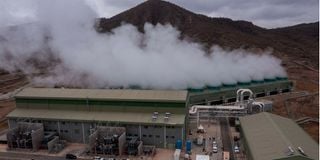Premium
Puzzle of ex-PSs who supply electricity to Kenya Power

KenGen’s Olkaria I geothermal station in Naivasha. Energy CS and the management of KenGen will meet the Energy Committee of the National Assembly on Tuesday.
What you need to know:
- The cost of power supplied by the IPPs varies, with some selling at Sh26 per kilowatt.
KenGen, the state-owned power generator, sells a kilowatt at Sh5.
Lawmakers want to be informed why two former Principal Secretaries and senior Kenya Power officials came to have a stake in independent power producers (IPPs) that got contracts now being blamed for the high cost of electricity.
The National Assembly Energy Committee has raised concerns about the officials’ shareholding in the firms as it would mean they played a part in signing of the contracts.
The team said the two former PSs, to be named next week, got skewed the contracts for their own benefit.
During a Thursday meeting with four IPPs – Gulf Power, Thika Power Ltd, Iberafrica Power East Africa and Triumph Energy – MPs were informed that Kenya Power has a 10 per cent stake in the four IPPs while the two former PSs have shares in at least two.
“Isn’t it a conflict of interest to do business with people who are supposed to pay you? These are the people who draw and approve contracts. They are the same individuals who pay you,” committee chairman Vincent Musyoka (Mwala) said.
“Why is Kenya Power a stakeholder? They can collude on the amount to supply.”
The cost of power supplied by the IPPs varies, with some selling at Sh26 per kilowatt.
KenGen, the state-owned power generator, sells a kilowatt at Sh5.
Auditor-General, Nancy Gathungu, in her report for the financial years 2017/18 to 2020/21 says Kenya Power buys a kilowatt at Sh5.3 from KenGen compared to an average of Sh15.3 from the IPPs.
MPs also want to know the capacity charge – payment Kenya Power makes to the IPPs for power produced, but not taken up by the grid – which they say could go as high as 97 per cent of the total money sent to the firms.
Gem MP, Elisha Odhiambo, said Kenyans in powerful positions are making life difficult for taxpayers.
“Thika Power is owned by former Ministry of Energy officials. It is Kenyans who are fleecing poor citizens. Kenyans should demand a reduction of the cost of power as the companies are owned by people in powerful positions,” Mr Odhiambo said.
Embakasi South MP Julius Mawathe said the committee would write to the Registrar of Companies to get names of the IPPs owners.
“If the people signing the contracts are former PSs, then Kenyans are being taken for ride,” Mr Mawathe said.
Gulf Energy General Manager, Norman Wanyiri, said no former PS has shares in the company.
“We will provide that information,” Mr Wanyiri said.
He, however, admitted that the Kenya Power Pension Scheme has a 10 per cent stake in Gulf Energy.
Other IPPs told the committee that Kenya Power, the Ministry of Energy and the Energy and Petroleum Regulatory Authority (Epra) have shares in their companies.
The IPPs have been under pressure from the committee to re-negotiate their contracts with the government as part of measures to reduce the cost of electricity.
Most of the IPPs’ contracts expire in 2034. Lawmakers say the agreements do not serve the interest of Kenyans.
The team will meet Energy CS Davis Chirchir and the management of Kenya Power, KenGen and Epra on Tuesday.





